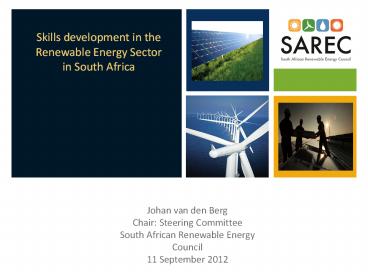Stu Porter - PowerPoint PPT Presentation
Title:
Stu Porter
Description:
Skills development in the Renewable Energy Sector in South Africa Johan van den Berg Chair: Steering Committee South African Renewable Energy Council – PowerPoint PPT presentation
Number of Views:89
Avg rating:3.0/5.0
Title: Stu Porter
1
Skills development in the Renewable Energy Sector
in South Africa
Johan van den Berg Chair Steering
Committee South African Renewable Energy
Council 11 September 2012
2
Summary
- Overview of the SA RE sector - IRP and green
economy accord the need for qualified people
quantifying it - Status quo whos doing what
- Industry initiatives (REIPPP)
- Partnership between Government and Private sector
- Further funding (REIPPP)
- Skills what do we need to make sure we need it?
- Road ahead
3
Skills - Overview of the SA RE sector
- In general South Africa is short of technical
skills - In RE as new field, same is true great
opportunity to create high level jobs - At NEDLAC deliberations on the Green Economy
Accord, SESSA, SAPVIA, SASTELA and SAWEA did an
industry projection on skills requirement
assuming the GEA is followed - Following words went into text commits to..the
following job-creation targets in the renewable
energy sector by 2020 50 000 green jobs, of
which approximately 6,500 will be engineers and
technicians.
4
Solar water heaters and energy efficiency SESSA
initiatives
- SESSA in collaboration with CSIR and DST are
creating a platform that will identify 2nd and
3rd tier manufacturers for the Eskom Solar water
heating roll-out - Through this process enterprise development and
job creation will occur - Skills development and continuous education will
be part of the initiative it will be a
monitored and measurable programme - Individual SESSA members are busy with pilot
projects already
5
Grid connected electricity projects and skills
Whos doing what SAPVIA, SASTELA, SAWEA
- SA Renewable Energy Training Centre in
development - extensively work-shopped - Planned as an ZAR 80 million facility CPUTs
Bellville campus - Funding applied for at DHET
- SANEDI has appointed an interim manager
additional funding from GIZ - Senior lecturer/researcher in wind energy at
Stellenbosch and CPUT advertised but not yet
filled.
6
Project level status quo
- In terms of the REIPPP tender process, 1 of
capital is payable by the developer at financial
close as a project development fee. This can be
ZAR 20 million in a large project - In addition 1.5 of turn over has to be spent on
socio economic development within a 50 km radius
these are also large amounts that can have
significant positive impacts - Thus, on project level, though not co-ordinated,
many developers are independently working on
skills development
7
Project level skills development an example
- One developer plans to provide tertiary training
to three students in the environmental field (as
it relates to wind energy) and three in the
technical field (as it relates to wind energy)
each year for the lifetime of the project (twenty
years), adding up to over 100 people trained. - There are more such examples
8
RE skills in SA Other initiatives
- GreenCape/GIZ/Bavarian Western Cape Partnership
are collaborating with the relevant SETA to
create accredited courses for wind farm and PV
maintenance staff (biogas in future) - Since 2011 Quality Council Trade and Occupation
Qualification for wind turbine maintenance and
service at NQF level 6 (2 levels above trade
test) with international benchmarking - In Oct 2012 same will happen for PV farm
maintenance and service technician with
international benchmarking - Same is planned for bio-digesters
- GIZ/SAGEN did a skills audit on RE in SA
9
Partnership between government and industry
- There is a need to train government officials in
the detail of Renewable Energy - This includes people working in permitting and
licensing but also policy makers - GIZ took a delegation of about 15 people to
Berlin in the last month with great success
industry was represented also - SAREC suggests a collaborative programme to
jointly with government create a programme that
can train government officials in RE - All parliamentarians invited to Windaba
information training session on 22 October in
CTICC
10
Partnership between government and industry
municipal level
- Distributed generation can provide more efficient
energy, more jobs per MW and more local content - There is a need to provide skills at distribution
and municipal levels in terms of - Technical evaluation of grid connection
applications - Administration of customer accounts and Net
Metering - Municipal electricity service department
budgeting - This requires high number of qualified resources,
government needs a plan to skill up munics
11
Further funding
- Skills development needs funding
- The Project Development Fee mentioned above seems
intended to cover the costs of the REIPPP
programme this is understandable - It seems however running into hundreds of
millions there may be money left over - Suggest consideration be given to ploughing this
back into local skills development
12
Skills development what do we have to do to
make sure we need it?
- We need a RE Industry
- For this we need an on-going and long term
renewable energy market commitment from
government - Sufficiently firm and medium term to ensure
localization of equipment supply and services - Further improvement of transparent and regular
communication between RE private sector and
government
13
ROAD AHEAD
- Ensure financial close for round 1 projects
before 30/09/12 so we can be sure there is going
to be an industry - Industry will continue the initiatives described
herein much progress has been made - Partnership with government to be activated
soonest to cerate a skills training programme for
government officials on RE - Additional funding should be jointly investigated
by government and industry
14
AN EMERGING GLOBAL PLAYER SAS POSSIBLE PLACE
IN THE 2015 GLOBAL PECKING ORDER (PV AND WIND)
15
THANK YOU
Johan van den Berg Interim chair johan_at_sawea.org.z
a 082 925 5680































